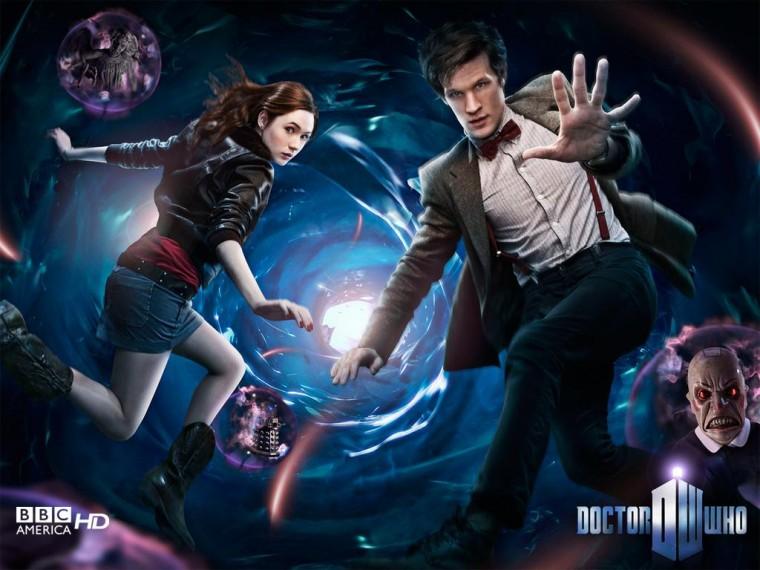“It’s bigger on the inside.”
February 8, 2011
One of my favorite sounds has become the arrival of the TARDIS onto another planet, perhaps a few hundred years ago, carrying my favorite Time Lord. Confused? Don’t be. Introduced to me last summer, Doctor Who has become the show I’m surprised I have been able to live without all these years. Originally aired in 1963 on BBC, Doctor Who is about a mysterious Time Lord who travels between time and space in his Police Box shaped TARDIS, or Time and Relative Dimension in Space. Though he still faced evil in the form of Daleks and Cybermen, Doctor Who started as an educational show, with the Doctor as a grandfather taking his granddaughter back in history to help her learn. The show evolved into science fiction adventure as the series went on until 1989, but it was reintroduced in 2005 with Christopher Eccleston as the Doctor. Did I mention there are eleven Doctors?
Though technically they are all the same person, after every season or so, the Doctor regenerates his body whenever he approaches death, one of the perks of having two hearts and being a Time Lord. With every new body, and essentially, actor, the Doctor envelopes a new personality, whether it be a calm Eccleston, a charming and exhilarating David Tennant (Barty Crouch, Jr. for us Harry Potter fans), or an erratic, and somewhat hipster, Matt Smith, who is the current Doctor. Though the current Doctor looks like a young man, he carries with him about 900 years of knowledge and experience of almost every species and time period.
While travelling through space and time, usually with a female companion, the Doctor meets aliens in the same time period as famous historical figures such as Shakespeare, Van Gogh, Agatha Christie, and Winston Churchill. Armed with a companion, the TARDIS, a sonic screwdriver, and complete faith in humanity, the Doctor saves civilizations by revealing the better and kinder side of mankind. Each episode is full of quirky dialogue, low-budget effects, which drastically improve by the fifth season, and valuable information about the Doctor himself. He attempts to maintain history (unless it’s not fixed in time, but don’t worry about that yet) and protects humans even though they almost never know the identity of their savior. That happens to be one of the greatest things about the Doctor. He risks everything, saves planets and entire species but never asks for a thank you, and though he has companions, he is always alone. He watched his entire species and planet die out during the Time War, making him the last Time Lord in the entire universe. Every few episodes, the audience is reminded of this notion, the idea of doing something for someone else, something much bigger than just yourself.
Each companion, whether it’s Rose Tyler, Martha Jones, Donna Noble, or Amy Pond, creates the perfect balance between a human and Time Lord relationship. Every time the TARDIS lands somewhere unexpected— 16th century Venice, the day before Vesuvius’ eruption in Pompeii, or in a child’s dream—the action and clever story arcs are unmistakable, making Doctor Who the longest running science fiction television show in the world. To continue its long reign, episodes from the new series have been made available on Syfy.com and Netflix.
One of the beautiful things about the series is that every episode manages to give insight into future mysteries and creates quick references to previous episodes. Past companions are mentioned, even make appearances, and no story is left unfinished. The show is more than just science fiction; it’s the culmination of love, compassion, anger, jealousy, and fear found in every being, both human and alien. If the only solution people can come up is to take arms when facing species that only know to kill, the Doctor chooses to talk. When the Eleventh Doctor meets an invisible killer alien, Krafayis, that has been tormenting 19th century Paris, he decides, “I suppose we could try talking to him. It would be interesting to hear his side of the story.”
The emotional appeal of Doctor Who is apparent: a mysterious man, alone in all respects of the word, who must make decisions for the greater good, even when those decisions are not his own. When it comes to the interaction between humans and aliens, the Doctor believes that people will prove who they are and what they are made of by simply “being good.” Despite seeing flying cars and blimps in New New York, or the future New York, he finds brilliance in a simple act of compassion that goes unnoticed by humans.
Mix the delicate nature of human and Time Lord souls with the mystery of the end of the universe approaching and the Doctor’s existence and future being tested, and you know you have a genius television show. With the right combination of humor, saving-the-world-action, and British charm, the Doctor has become somewhat of a hero for me. No matter what possible universe-ending-species-dying crisis is at hand, the Doctor firmly believes, “In my experiences, there is, surprisingly, always hope.”
To contact The Ionian’s Ranisha Singh, e-mail her at [email protected].







